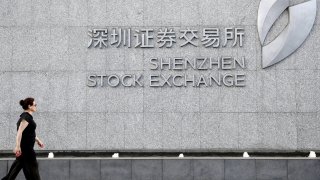
- Shares in Asia-Pacific were mixed on Tuesday, with Chinese stocks being among the biggest losers regionally.
- Shares of conglomerate SoftBank Group slipped 0.9%, with the firm announcing Tuesday plans to take Arm public after a planned sale of the subsidiary to Nvidia collapsed due to "significant regulatory challenges."
- Global markets have continued to see a wave of volatility as investors continue to assess the outlook for factors such as central bank policy normalization.
SINGAPORE — Shares in Asia-Pacific were mixed on Tuesday, with Chinese stocks among the biggest losers regionally.
By the Tuesday market close in mainland China, the Shenzhen component slipped 0.975% to 13,325.41. The Shanghai composite fared better, recovering from its earlier losses as it rose 0.67% to 3,452.63.
Hong Kong's Hang Seng index also fell 0.77%, as of its final hour of trading, with Chinese tech stocks in the city dropping: Alibaba plunged 2.26% and Tencent declined 1.38% while Meituan slipped 1.95%. The Hang Seng Tech index shed 1.21%.
Get San Diego local news, weather forecasts, sports and lifestyle stories to your inbox. Sign up for NBC San Diego newsletters.
Market sentiment on China stocks may have taken a hit after the U.S. Commerce Department said Monday it had added 33 Chinese entities to a red-flag export list. One of the affected firms, WuXi Biologics, saw its Hong Kong-listed stock plunge more than 20% before trading was halted on Tuesday.
Elsewhere, Japan's Nikkei 225 gained 0.13% to close at 27,284.52 while the Topix index climbed 0.42% to 1,934.06. Shares of conglomerate SoftBank Group slipped 0.9%, with the firm announcing plans to take Arm public after a planned sale of the subsidiary to Nvidia collapsed due to "significant regulatory challenges."
South Korea's Kospi finished the trading day fractionally higher at 2,746.47. In Australia, the S&P/ASX 200 climbed 1.07% on the day to 7,186.70.
Money Report
MSCI's broadest index of Asia-Pacific shares outside Japan stood little changed.
Global markets have continued to see a wave of volatility as investors continue to assess the outlook for factors such as central bank policy normalization, with expectations that fast-rising wages in the U.S. could lead the Federal Reserve to raise interest rates even higher this year.
"For now at least, inflation and related central bank thinking remains by far the bigger influence on market sentiment," Ray Attrill, head of foreign exchange strategy at National Australia Bank, wrote in a Tuesday note.
Currencies and oil
The U.S. dollar index, which tracks the greenback against a basket of its peers, was at 95.588 — off levels around 95.2 seen late last week.
The Japanese yen traded at 115.50 per dollar, weakening after trading close to 115 against the greenback earlier. The Australian dollar was at $0.712 after yesterday's climb from below $0.708.
Oil prices were higher in the afternoon of Asia trading hours, with international benchmark Brent crude futures up 0.04% to $92.73 per barrel. U.S. crude futures rose 0.13% to $91.44 per barrel.






